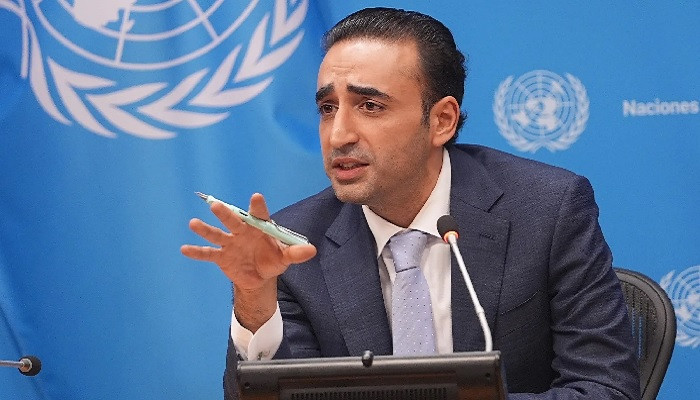Pakistan Urges Global Powers to Mediate India Tensions
Amid continued tensions following a recent conflict, Pakistan has appealed to global superpowers to step in and facilitate the resolution of critical issues with India.
This appeal was voiced by Bilawal Bhutto Zardari, former foreign minister and a prominent figure in the Pakistan Peoples Party (PPP), during a series of significant meetings in London.
Mr. Zardari is heading a delegation to convey Pakistan’s viewpoint on the recent clashes with India to the global community, aiming to counteract what it claims are unsubstantiated allegations from New Delhi. This outreach effort has included a visit to the United States, their current stay in London, and a planned trip to Brussels.
The delegation includes former foreign ministers Hina Rabbani Khar and Khurram Dastgir, Senators Sherry Rehman, Musadik Malik, Faisal Subzwari, and Bushra Anjum Butt, alongside experienced envoys Jalil Abbas Jilani and Tehmina Janjua.
Statements from Bilawal Bhutto in London
Speaking to Pakistani media in London, Bilawal Bhutto stated, “We held the advantage [during the conflict]. Despite this, we consented to a ceasefire, provided that further discussions on all points of contention would occur at a neutral venue.” When questioned about the prospect of resolving the Jammu & Kashmir dispute after US mediation, Bilawal expressed hope that “the Trump administration will honor its pledge,” asserting that Pakistan’s defense posture was superior to India’s during the confrontation.
Bilawal claimed that Pakistan had targeted twenty Indian aircraft but only downed six, exercising restraint for the sake of global peace. He affirmed that Pakistan emerged victorious in the conflict against India, demonstrating its resilience to the world.
Call for International Intervention
“We hope that international actors, including the United States and the United Kingdom, will intervene and persuade India to address our concerns through dialogue,” he stated, adding, “We seek discussions with India on all matters, including Kashmir, as the resolution to all issues begins there.”
Bilawal emphasized that Pakistan had demonstrated its “strength” by neutralizing six Indian jets, and now, the focus should be on establishing peace. He clarified that these six aircraft were responsible for attacks resulting in civilian casualties, and that while Pakistan had targeted twenty Indian planes, it chose restraint to promote peace.
He further noted that throughout the conflict, Pakistan was perceived as a “rational and responsible state”.
Bilawal delivered addresses at Chatham House and the International Institute for Strategic Studies (IISS).
At IISS, Bilawal asserted that India’s actions represented a clear infringement upon Pakistan’s sovereignty, international law, and the UN Charter. He reiterated that the Kashmir dispute remains the primary obstacle to lasting peace and stability in the region, urging global support for meaningful dialogue and adherence to international agreements.
He condemned India’s unilateral suspension of the Indus Waters Treaty (IWT), cautioning that the “weaponisation of water undermines international norms and sets a dangerous precedent”. He urged the global community to acknowledge this alarming development and hold India accountable.
“Pakistan is a responsible nuclear power and has made it clear that obstructing water flow would be considered an act of war,” he said.
The delegation also engaged with Hamish Falconer, the UK’s Middle East minister, and his team at the Foreign, Commonwealth & Development Office (FCDO). Bilawal and his delegation later met with Members of Parliament at the UK Parliament to advocate for Pakistan’s position.
Bilawal highlighted the attempts by Indian Prime Minister Narendra Modi’s administration to distort the truth and facts surrounding the recent incidents, accusing India of spreading misinformation.
“India has accused Pakistan of involvement in the Pahalgam attack without providing any evidence. We offered an impartial investigation into the Pahalgam incident,” he added.
On April 22, a terrorist attack in Pahalgam resulted in the deaths of at least 26 civilians. New Delhi attributed the attack to Islamabad, a claim that leaders in Islamabad have refuted.
The PPP chairman also praised US President Donald Trump’s efforts to mediate and prevent a potential war between the two nations.
“US President’s role in ceasefire is commendable,” he added.
Earlier, the delegation arrived in the UK after a series of productive meetings with US Congress members and senators in Washington and New York.
The delegation, headed by Bilawal, participated in over 50 meetings to articulate Pakistan’s perspective on regional peace, its disputes with India, and to emphasize New Delhi’s provocations and aggression.



Comments (0)
No comments yet. Be the first to comment!
Leave a Comment